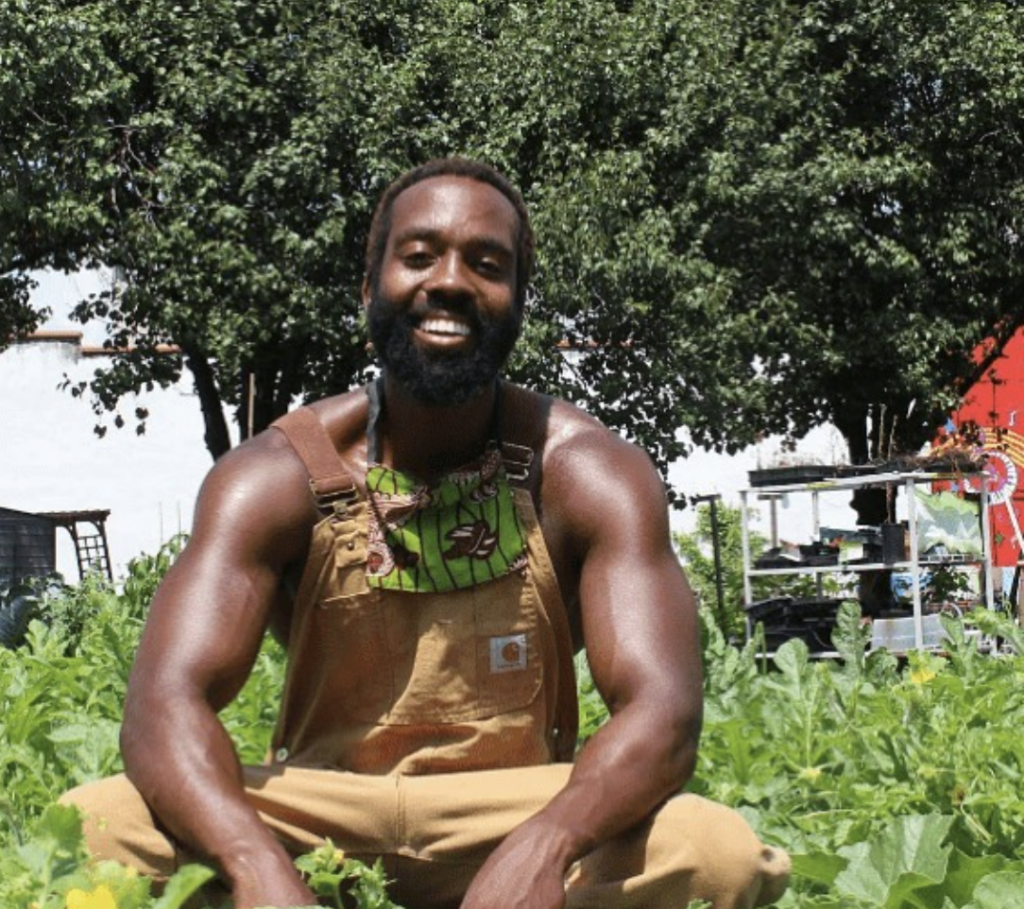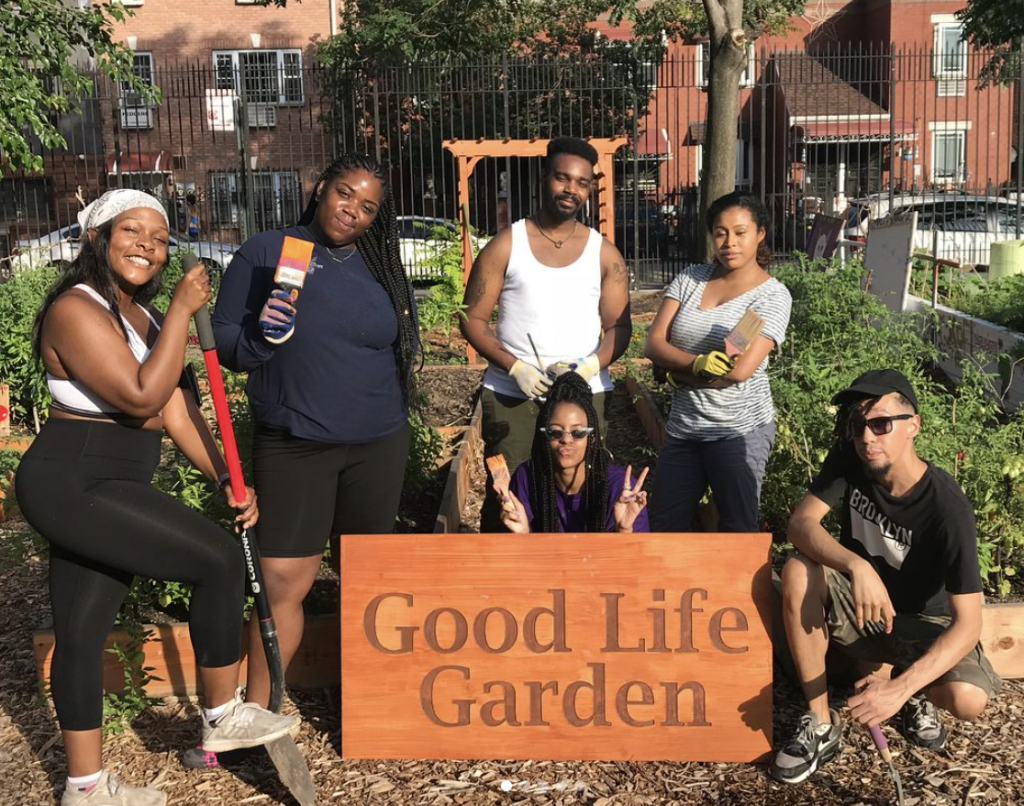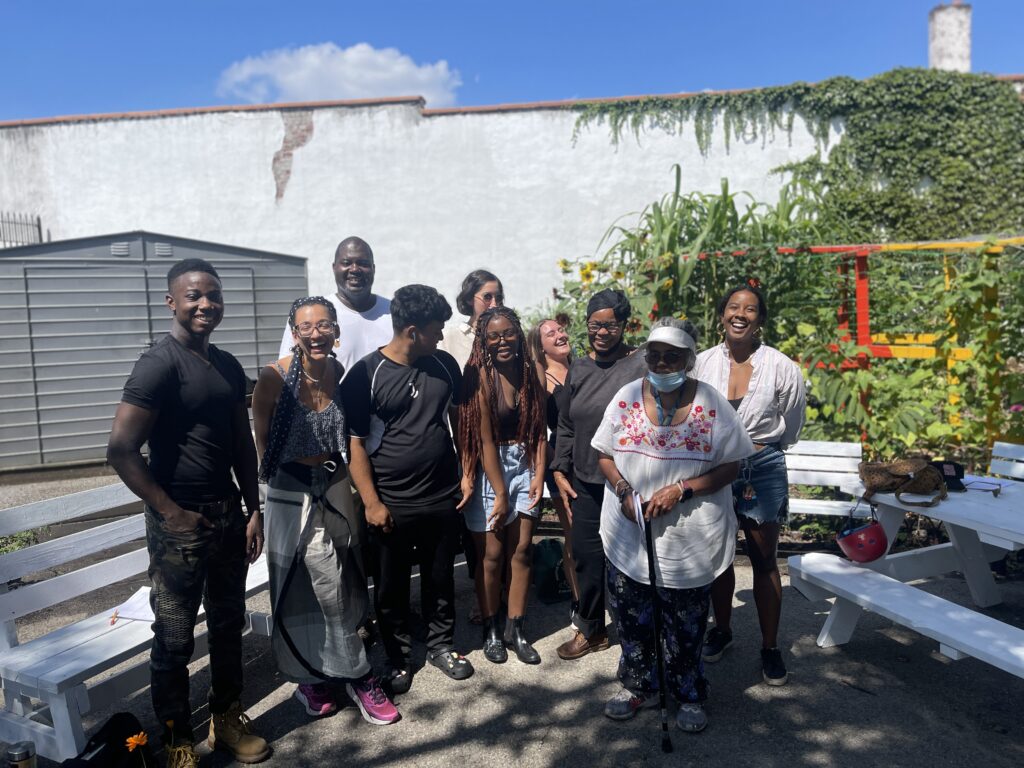Kofi Thomas Fundraises an Ecosystem of Change
Published September 28, 2022
When Kofi Thomas was volunteering at The Peoples Garden in Bushwick, an elder told him about a nearby piece of land that was being used as a trash dump. That space, now called the Good Life Garden, has grown into a green space, a hub for community gathering, and a place for celebration and joy. “When the project started, I just thought we were gonna grow some food. It’s been a lot more than that,” says Kofi.
Since Good Life Garden opened its gates in 2018, Kofi has crowdfunded over $25,000 with ioby through four successful projects to help sustain and grow the garden’s presence and impact.
“The path to making the land and becoming stewards of the land wasn’t something that came easy,” Kofi says. He started researching the space in 2017 when he noticed a massive empty lot that had become neglected and downtrodden with endless mountains of trash. The process involved a lot of moving parts. After talking to his neighbors, looking up property records, talking to a lawyer, and reading a tax map, Kofi finally discovered the land was owned by the NYC Parks Department. “I hopped on the phone with them and said ‘Hey, there’s this 13,000 square foot garden that has fallen off the map, do you know anything about this?’”
His work and conversations culminated in a visioning meeting with the neighbors and the parks department where they agreed on keeping the space an NYC Parks property. As a result, the community was allowed to begin the process of rebuilding and recreating.
Good Life has had a potent and powerful impact on the community since it began. Once referred to as “the cemetery,” Kofi says there was always a cloud of negative energy around the space. “People wouldn’t walk their kids on that corner, they would walk around to avoid situations such as assaults. A few months after we opened the garden, one of the women on the street who was walking by started crying because she had been verbally assaulted there and hadn’t walked by ever since.” After Kofi and his neighbors cleared out the area and began the process of revitalization, “the cemetery” transformed into a safer, more welcoming area.
“Now, to see families walking by…it means a lot. You have people who have a history with the garden who have seen it as dangerous and scary, but they’ve seen the transformation and been a part of that transformation. When we get together, we can change things.”
While the garden has meant a lot to his community and neighbors in Bushwick, Kofi’s relationship to the land and environment is something that he sees as integral to his personal identity as well. Growing up in Boston the son of two immigrant parents from Dominica, his childhood brings back vivid memories of plants in the house and bags with spices around the kitchen. “I really gained a reverence for the environment,” he says. “We’re not taking care of the environment, it’s taking care of us. It’s a balance.”
He finds a lot of joy and harmony in gardening and in the environment, but that joy coexists alongside an acknowledgment that the land we occupy is rooted in the history of slavery and oppression. “There’s a lot of trauma around gardening, farming, or being in nature, especially for a lot of Black and Brown folk. I’ve been more cognizant of that and trying to do more to address that and heal those wounds. Going back to the Caribbean is really how my eyes got opened to the environment. When I was there I learned more about why so many of our people here (in the US) don’t have that connection to the land.”
This summer, Kofi launched and successfully funded Habla Enviromentalism, a project that aims to spread awareness of the environment through the lens and practice of Latino Caribbean thought. Kofi’s project was funded in part through the Power Up Neighborhood Match Program, made possible with the generous support of Con Edison. The project responds to the colonization of environmentalist movements. “There’s this eurocentric idea of how you can ‘save the planet’ or an exclusive club where you have to purchase a special item showing everyone that you are an ally of the environment,” says Kofi. “Meanwhile, the history of Latino-Caribbean people and their history as environmentalists and stewards of the land has been pushed to the side, whitewashed, or all-the-way eroded. Habla Environmentalism creates an education and awareness of the indigenous tribes of the Latino and Caribbean diaspora and the farmers from Africa that were enslaved and worked the lands.” As Kofi began planning for the project, he developed themes around sharing these forms of knowledge with his neighbors in Bushwick. Relating to diasporic traditions, he wondered: “What were some of the practices they were doing to maintain the land and conserve it? What types of generative agriculture were they using? How were they using nature for other parts of their lives?”
Using the land as a form of cultural expression is one of the main themes of Kofi’s most recent ioby campaign, the Community Greenhouse. The Greenhouse project just reached its $10K goal but is still raising funds until the end of September. This project was funded through ioby’s NYC Environmental Justice & Sustainability Match Program.
The Greenhouse will allow Kofi and his neighbors a chance to plant and grow their own seeds. Currently, the garden’s community members wait for plant sales that take place every year in early May. As Kofi explains, “We are at the mercy of big plant companies and their market crops. Being a garden that wants to be self reliant and sustainable, do our thing, and celebrate our own cultures on the block, we are working on building a seed starting structure so that we can grow food that is culturally important to us. We’ll be able to get seeds sent to us from our countries of origin and have a place to start those seeds when we want to start them. It’s gonna give us more power and autonomy as farmers to extend our growing season and allow us to express ourselves and cultures through the land.”
In addition to allowing more space for cultural expression, the project will help Good Life Garden continue growing and providing for more surrounding communities. “We have neighbors all the time who want to start growing. If we have our own crops, we can work towards building what I call a microagriculture. We will be trading with each other which starts the conversations and supports our overall mission of education and empowerment.”
The process of sharing and growing together is an ideal Kofi holds with high regard, and it’s also an ideal he believes extends beyond the Good Life Garden. He’s participated in ioby panel discussions where he enjoyed sharing knowledge and “cross-pollinated innovation” with other project leaders. He sees change as something that originates and grows within our local communities. “I want people to readjust their idea of what philanthropy is and understand how important it is to give and invest locally.”
If you live in Brooklyn (or ever find yourself there), you can find Kofi and the Good Life Garden at 50 Goodwin Place in Bushwick.



